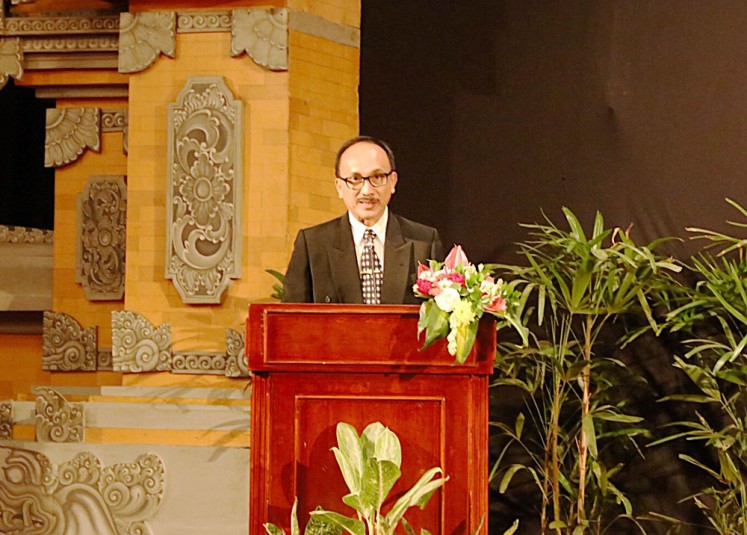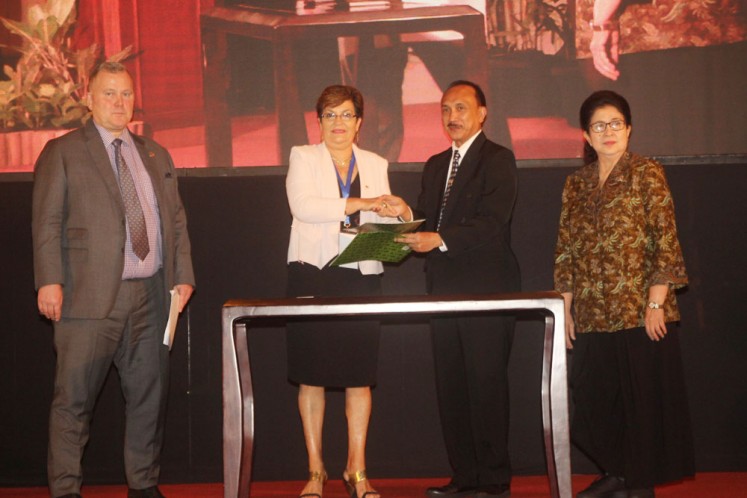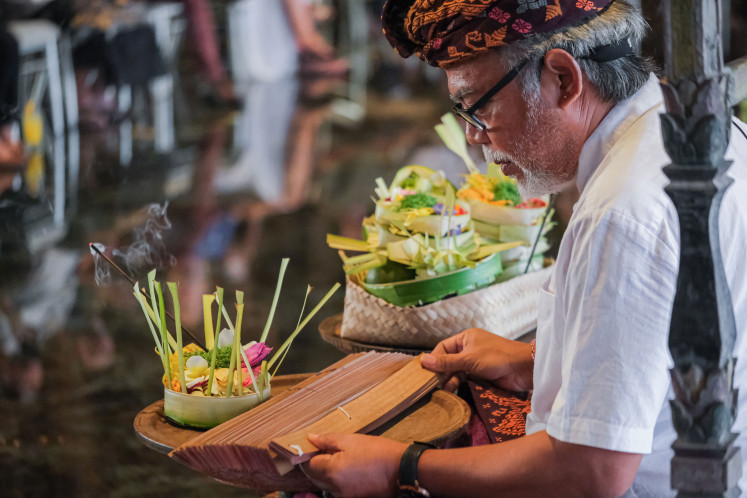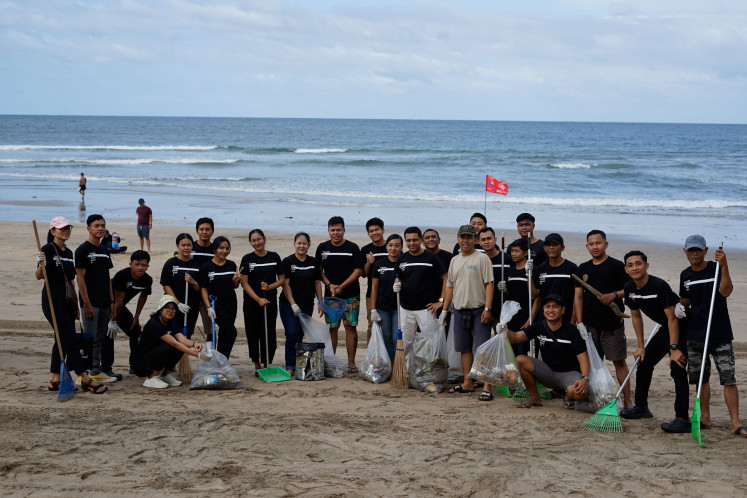A multilateral approach to an interconnected world
In an increasingly interconnected world, inter-governmental cooperation and collaboration are all the more crucial as the global community works towards the achievement of the 2030 Agenda for Sustainable Development underpinned by its 17 Sustainable Development Goals (SDGs) whose ultimate pledge is to leave no one behind.
Change Size
 Partnering for family welfare: Minister of Health Nila Djuwita F. Moeloek (center) poses for a picture with (from sixth left) Seychelles Family Affairs Minister Mitcy Larue, UNFPA Asia Pacific Regional Director Bjorn Andersson, South African Social Development Minister Susan Shabangu, and National Population and Family Planning Board (BKKBN) Chairperson, Dr. Sigit Priohutomo after the opening of the Inter-Ministerial Conference on South-South and Triangular Cooperation in Kuta, Bali, on Tuesday. (JP/Zul Trio Anggono)
Partnering for family welfare: Minister of Health Nila Djuwita F. Moeloek (center) poses for a picture with (from sixth left) Seychelles Family Affairs Minister Mitcy Larue, UNFPA Asia Pacific Regional Director Bjorn Andersson, South African Social Development Minister Susan Shabangu, and National Population and Family Planning Board (BKKBN) Chairperson, Dr. Sigit Priohutomo after the opening of the Inter-Ministerial Conference on South-South and Triangular Cooperation in Kuta, Bali, on Tuesday. (JP/Zul Trio Anggono)
B
strong>BKKBN, UNFPA and PPD organizing inter-ministerial conference to address South-South and Triangular Cooperation on Population and Development Issues Influencing the 2030 SDGs Agenda

In an increasingly interconnected world, inter-governmental cooperation and collaboration are all the more crucial as the global community works towards the achievement of the 2030 Agenda for Sustainable Development underpinned by its 17 Sustainable Development Goals (SDGs) whose ultimate pledge is to leave no one behind.
To fulfill this vision, a multilateral approach to population and development issues is more crucial than ever, an approach symbolized strongly by what is known as South-South and Triangular Cooperation in which developing countries work together across a range of programmes and platforms with a view to strengthening capacity, adapting and adopting best practices that would benefit all citizens - including women and girls, young persons, and marginalized and vulnerable populations.
It is in this context that the National Population and Family Planning Board of Indonesia (BKKBN), in collaboration with the United Nations Population Fund (UNFPA), and Partners in Population and Development (PPD), is organizing an inter-ministerial conference from September 18 to 20 in Kuta, Bali, addressing the latest developments in South-South cooperation (SSC), to assist developing countries involved in attaining the 2030 Agenda by mainstreaming population and development issues across the SDGs.
The Bali conference will be attended by participants from around 50 countries.
Besides exchanging best practices on population and development issues, like-minded countries could also explore concrete bilateral or multilateral cooperation opportunities related to the 2030 Agenda enabling them to co-create programmes, which can leverage a higher magnitude of social impact related to the SDGs.
Countries joining this conference will also formulate a consensus which they will present to audience members attending the upcoming SSC high-level conference (the BAPA – Buenos Aires Plan of Action +40 conference) in Buenos Aires, Argentina, in March of next year.
Among the conference speakers in Bali are Minister of Health Nila Djuwita F. Moeloek, United Nations Population Fund (UNFPA) Asia Pacific Regional Director, Bjorn Andersson (representing UNFPA Executive Director, Dr. Natalia Kanem), secretary of Partners in Population and Development (PPD) Susan Sabangu and BKKBN Chairperson, Dr. Sigit Priohutomo. Ministers from several countries will also participate in this conference.

Discussion panels will include experts and practitioners who work in the population, social and economic development sectors. The panel discussions will include case studies on how countries work together through South-South and Triangular Cooperation in the implementation of SDGs-related programmes in various countries, including critical evaluation of their implementation.
Specifically, the conference will cover six main topics.
The first one is the issue of low fertility rates and ageing populations, trends that are being seen in more and more countries globally, including many in the Asia-Pacific region.
The second is about what is called the demographic bonus and how to leverage the demographic dividend offered by achieving the potential of youth, as well as an increasingly important topic - youth, peace and security.
The third is about sexual and reproductive health as well as rights-based family planning whose success is vital for a country’s development.
The fourth is about humanitarian initiatives in a world that is witnessing more and more natural disasters and conflict-related crises, while the fifth technical session covers innovation in population data, including surveys and census methodologies, especially important ahead of the 2020 round of censuses in many countries.
The sixth session will discuss the impact assessment of SSTC in mitigating population and development challenges.
About South-South and Triangular Cooperation
The fundamental idea of SSTC was conceived in 1955, when the Indonesian government of the time, along with several other countries, organized the Asia Africa Conference in Bandung, West Java, to promote economic and cultural cooperation among both continents. The community has now expanded to include Caribbean and South American countries –collectively forming what’s known as the “Global South”.

This cooperation stands on a sense of solidarity and shared vision among developing countries, bonded by shared experience and history, and based on the premise of equal partnerships. All countries involved are encouraged to collectively develop an adequate partnership system while evaluating the quality and social impacts of their socio-economic development programs.
SSC is seen as complementary to the North-South cooperation axis of inter-country collaboration.
Many high-level conferences addressing SSC have been organized, including the 2009 UN high-level conference in Kenya. Currently, SSC is focusing on population issues as key elements in a collective effort to attain the SDGs while taking into consideration the member countries’ sociological, economic and cultural aspects.
This collective deliberation allows member countries to come up with more effective solutions for a range ofchallenges while accelerating the implementation of possible solutions.
Indonesia itself has been very active in supporting SSC programmes in two areas: population and development issues. Since the 1980s, the Indonesian government has been actively sharing its experiences in implementing its family planning programme with other developing countries.
Indonesia has also been facilitating exchange programs for family planning professionals, so far involving 5,200 individuals from 104 countries in various capacity-building and training programs. Several cooperation programmes in the two domains -- where Indonesia plays a significant role -- have also been shown to positively impact the socio-economic development of many developing countries that adopt them.
The best practices of the South-South partnership’s population and development programmes have also been adopted by countries that attended the International Conference on Population and Development (ICPD) in 1994, where 179 countries came together and in which reproductive health and rights, women’s empowerment and gender equality became central to sustainable development.
The ICPD Programme of Action and the myriad rights enshrined within remain central to both the work of UNFPA as well as the 2030 Agenda.
In 2019, the world will mark the 25th anniversary of ICPD – and the 50th anniversary of UNFPA itself – key milestones pertaining to which the continued strengthening and success of South-South Cooperation and its multilateral vision play a truly important role.









